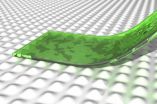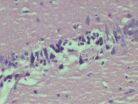(Press-News.org) AUDIO:
The gunshot is a binaural recording using KEMAR, the weapon was an SA80 assault rifle and the microphone is 50m downrange from the firer and approximately 30cm from the bullet...
Click here for more information.
University of Southampton researchers, with assistance from the Ministry of Defence, have conducted the first study to identify the hearing requirements of British soldiers fighting on the frontline.
The study, which provides an important and novel insight into the frontline experiences of British infantry personnel, identified 17 'auditory tasks', such as 'hearing grid references' and 'locating enemy movement in maize fields', carried out on operational duties abroad.
By identifying these tasks, researchers will be able to develop a new auditory fitness for duty test to determine the impact of hearing loss among infantry personnel and ensure that personnel are given appropriate training and equipment before deployment.
Zoë Bevis, from the University's Institute of Sound and Vibration Research (ISVR) and study co-author, says: "This new information allows us to better understand the challenges faced by our frontline soldiers.
"As well as identifying the auditory tasks, we also came across other interesting opinions during the study. Soldiers felt that they couldn't hear as well when they were performing several tasks at once, for instance listening to a radio while looking out for a signal, or when they are in a very stressful environment, such as enemy contact in combat.
AUDIO:
This is an example of a command recorded through a military radio headset.
Click here for more information.
"Those comments emphasise how important it is for the infantry to hear important signals whilst maintaining their situational awareness. Participants felt their hearing played a fundamental part in their safety and their ability to carry out the job expected of them."
The study, which is published in Noise and Health journal, consisted of 16 focus groups involving 80 British army personnel. The focus groups included open-ended questions about the auditory tasks performed on operational duty; these tasks were divided into subthemes of sound detection, speech communication and sound localisation.
Analysis of 1,177 individual comments resulted in two main themes (1) the auditory tasks personnel were expected to perform and (2) situations where personnel felt their hearing ability was reduced. Researchers also outlined attitudes to hearing health, noise exposure and hearing protection.
Zoë adds: "We know that infantry personnel are at increased risk of hearing impairment due to the nature of their job. With this new information, we can develop methods to assess whether hearing impaired soldiers can perform the frontline auditory tasks necessary for their safety and effectiveness."
AUDIO:
This is an example of a battlefield command recorded through a military radio headset.
Click here for more information.
The opinions and attitudes documented in this study will help researchers to gain a real insight into the challenging environments faced by infantry personnel fighting on the frontline. The information can be used to aid the continuing development of communication equipment, hearing protection, training programmes and measures of auditory fitness.
The study also provides a model for job analysis that is transferable to many fields of work-related fitness for duty – for example respiratory fitness standards for policemen or eyesight checks for air traffic controllers.
INFORMATION:
The research was funded, in full, by the Ministry of Defence.
Fit for the frontline? New study identifies the hearing requirements of British soldiers
2014-07-09
ELSE PRESS RELEASES FROM THIS DATE:
Even geckos can lose their grip
2014-07-09
Not even geckos and spiders can sit upside down forever. Nanophysics makes sure of that. Mechanics researchers at Linköping University have demonstrated this in an article just published in Physical Review E. Knowledge that can be of great industrial benefit.
Geckos and spiders that seem to be able to sit still forever, and walk around upside down have fascinated researchers worldwide for many years. We will soon be able to buy smart new fasteners that hold the same way as the gecko's foot. But the fact is, sooner or later the grip is lost, no matter how little force ...
Frogs have developed rapid defences against the red swamp crayfish
2014-07-09
The common frog is one of the amphibians with the highest distribution in the Iberian Peninsula. It reproduces preferably in permanent areas of water where it comes into contact with the red swamp crayfish, which preys on its larvae. Research carried out by the Spaniard Germán Orizaola from the University of Uppsala (Sweden) confirms that the larvae of these frogs have developed a defensive response to the invasive species. They also have deeper tails and larger bodies if they co-exist with the crayfish.
Numerous invasive organisms are currently spreading outside of their ...
RUB chemists develop novel catalyst with 2 functions
2014-07-09
Chemists at the Ruhr-Universität Bochum have made a decisive step towards more cost-efficient regenerative fuel cells and rechargeable metal-air batteries. They developed a new type of catalyst on the basis of carbon, which can facilitate two opposite reactions: electrolysis of water and combustion of hydrogen with oxygen. A catalyst of this kind might make the storage of wind and solar energy and the manufacture of cost-efficient batteries, for example for electric cars, possible. The team published their report in the "International Edition" of the magazine "Angewandte ...
Rotten egg gas holds key to healthcare therapies
2014-07-09
It may smell of flatulence and have a reputation for being highly toxic, but when used in the right tiny dosage, hydrogen sulfide is now being being found to offer potential health benefits in a range of issues, from diabetes to stroke, heart attacks and dementia. A new compound (AP39), designed and made at the University of Exeter, could hold the key to future therapies, by targeting delivery of very small amounts of the substance to the right (or key) places inside cells.
Scientists in Exeter have already found that the compound protects mitochondria – the "powerhouse" ...
NIH launches Phase I clinical trial of novel drug to treat Clostridium difficile infection
2014-07-09
The National Institute of Allergy and Infectious Diseases (NIAID), part of the National Institutes of Health, has launched an early-stage clinical trial of CRS3123, an investigational oral antibiotic intended to treat Clostridium difficile (C. difficile) infection. CRS3123 (previously known as REP3123) is a narrow-spectrum agent that inhibits C. difficile growth while sparing normal intestinal bacteria.
The Phase I trial will enroll up to 30 healthy men and women ages 18 to 45 in a dose-escalation study to evaluate the investigational drug's safety and tolerability. Quintiles, ...
The impact of big data on health care: Health Affairs' July issue
2014-07-09
Big data can yield big savings, if they are used in the right ways. David W. Bates of the Brigham and Women's Hospital and coauthors analyzed six use cases with strong opportunities for cost savings—high-cost patients; readmissions; triage; decompensation (when a patient's condition worsens); adverse events; and treatment optimization when a disease affects multiple organ systems. They suspect that cost-savings benefits will vary widely, though the current costs associated with all six scenarios will be significant. The authors suggest that using analytics for multiple ...
Discovery of new drug targets for memory impairment in Alzheimer's disease
2014-07-09
VIDEO:
This is a movie showing how the reactive astrocytes in the brains of Alzheimer's disease model produce the inhibitory transmitter GABA by the enzyme MAO-B and release GABA through the...
Click here for more information.
Alzheimer's disease, which is the most common cause of dementia, is fatal and currently, there is no cure. In Alzheimer's disease, brain cells are damaged and destroyed, leading to devastating memory loss. It is reported that 1 in 8 Americans aged 65 or over ...
Neuroprotective effects of low concentration of lithium
2014-07-09
Lithium, as a neuroprotective agent, benefits for neuronal survival. Recent cDNA array studies have demonstrated that mood stabilizer lithium exhibits neuroprotective effects through multiple targets. Dr. Riadh Nciri and his team, Purpan Medicine Faculty, Paul Sabatier University, France, exposed SH-SY5Y cells to 0.5 mmol/L lithium carbonate for 25-50 weeks and then detected the expression levels of some neurobiology related genes and post-translational modifications of stress proteins in SH-SY5Y cells. cDNA arrays showed that pyruvate kinase 2 (PKM2) and calmodulin 3 expression ...
Filiform needle acupuncture versus antidepressant drugs for poststroke depression
2014-07-09
Whether acupuncture or antidepressant drugs exhibit better therapeutic effects on poststroke depression remains disputed. The effectiveness of acupuncture for poststroke depression can be evaluated by evidence-based medicine studies, which provide evidence for clinical application. Systematic review or meta-analysis studies have demonstrated that early acupuncture is superior to conventional western medicine in the treatment of poststroke depression. However, high-quality literatures are needed to further validate the effectiveness of acupuncture for poststroke depression. ...
What aggravates hippocampal neuronal injury in acute cerebral ischemia?
2014-07-09
Activation of extracellular signal-regulated kinase 1/2 has been demonstrated in acute cerebral ischemia. Yaning Zhao and her colleagues, Hebei United University, China induced transient whole-brain ischemia by four-vessel occlusion in normal and diabetic rats and intravenously injected diabetic rats with extracellular signal-regulated kinase 1/2 30 minutes before ischemia as a pretreatment. Results showed that during the pathological progression of cerebral ischemia/reperfusion in rats, activation of extracellular signal-regulated kinase 1/2 exhibits protective effect ...




